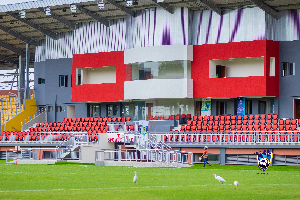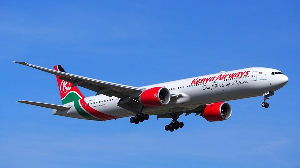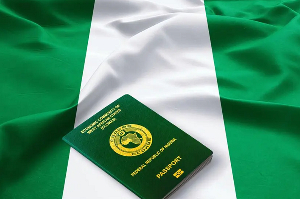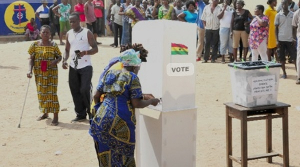- Home - News
- TWI News | TV
- Polls
- Year In Review
- News Archive
- Crime & Punishment
- Politics
- Regional
- Editorial
- Health
- Ghanaians Abroad
- Tabloid
- Africa
- Religion
- Election 2020
- Coronavirus
- News Videos | TV
- Photo Archives
- News Headlines
- Press Release
General News of Sunday, 7 December 2008
Source: AFP
Ethnicity unlikely to sway Ghana vote
ACCRA (AFP) – Ghana's ethnic tensions have not taken a hold in politics and are unlikely to influence Sunday's presidential and parliamentary vote as they have in other parts of Africa, experts say.
Political and electoral observers have ruled out a Kenya scenario in Ghana, often hailed as a model of a stable African democracy.
"You can't have that in Ghana. This ethnicity thing is not so pronounced in Ghana as it is in other parts of Africa," said Vincent Crabbe, a retired Supreme court judge.
"Our situation is different and that is why we get up against anybody who tries to preach ethnic rivalry," said Crabbe, a former head of the country's electoral commission in the 1960s.
Ghana goes to the polls on Sunday to pick a president and 230 lawmakers in elections followed all the more closely since the electoral crises in Nigeria, Kenya and Zimbabwe -- where put together, thousands of people died in electoral violence.
"Ghana is in an enviable but challenging position of showing the way in Africa in general, regarding peaceful and credible elections and democratic growth," said a respected network of local poll observers, the Coalition of Domestic Election Observers (CODEO), in a pre-poll statement Saturday.
"(It's) a chance to defy the trend of failed elections elsewhere in Africa," CODEO added.
John Larvie of Ghana's Centre for Democratic Development (CDD) said while some parties may be perceived as having strongholds among certain tribes, the impact on the vote is negligible.
"The ethnic card existed but it has been dissipated over the years," he said.
To illustrate that tribal and regional affiliation is not such a great issue, the two leading presidential candidates in Sunday's polls -- the ruling party's Nana Akufo-Addo and opposition John Atta-Mills -- have both picked running mates from the north.
"So the ethnicity factor has been narrowed down in this election. This election has been desribed as one that focused on issues rather than ethnicity," said Theophilus Dowetin of the Stockholm-based International Institute for Democracy and Electoral Assistance (IDEA).
In many elections, Ghanaians do what is popularly known as the "skirt-and-blouse" vote, where one can vote for a parliamentary candidate from one party and a presidential one from another -- in which case the skirt and blouse will have contrasting colours.
"That shows the levels of sophistication of our democracy," said Larvie.
"In fairness, the campaign period seems to have focused on issues. However, one will have to wait and see the final returns to determine if ethnic affinities played a role," Christopher Fomunyoh, head of the Africa desk at the Washington-based National Democratic Institute (NDI), told AFP.
In the run up to the vote, firebrand twice former head of state Jerry Rawlings was accused of trying to stoke ethnic rivalries when he addressed a rally for Atta-Mills and referred to one ethnic group dominating the country's politics.
"We don't want tribal politics in our country," the NPP's Akufo-Addo told his final campaign rally on Saturday evening.
Atta-Mills, from the National Democratic Congress (NDC), said his party was for peace.
"We in the NDC have invested in peace and we will do all we can to ensure there is peace. Let elections be free and transparent," said Atta-Mills addressing supporters at his final campaign rally in Tema, Ghana's port and industrial hub.
The country of 23 million people has had its share of pre-electoral woes, including allegations of abuse of office, concerns over bloated voters' roll and anxiety over possible vote rigging, but observers say the impact of these on the poll outcome depends on how the election is conducted.










